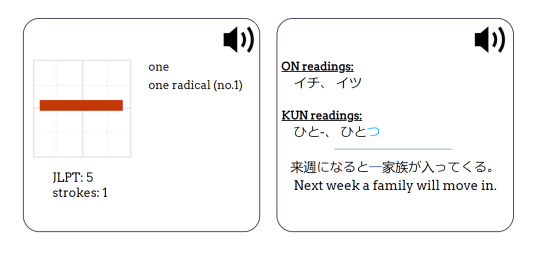#japanese selfstudy
Explore tagged Tumblr posts
Text

Nature in Japanese
For more lesson about Japanese language, you can visit my blog.
Just click the link below:
#japanese#language#selfstudy#selfstudy japanese language#japanese language selfstudy#hiragana#katakana
0 notes
Text
Japanese Kanji Flashcards




the front part: Kanji, Possible meanings, JLPT level, Strokes number
the back page: Onyomi and Kunyomi readings, example and example translation
for more study flashcards : https://payhip.com/b/t8nD2
#study#selfstudy#japanese#japanese language#kanji#chinese characters#study kanji#jlpt#languages#flash cards#flashcards#learning languages
0 notes
Text
Japanese vocab: Valentine’s day

バレンタインデー - Valentine’s day

ホワイトデー - White day
マシュマロデー - White day (Marshmallow day)
オレンジデー - Orange day or Partner day
彼女 - かのじょ - Girlfriend
彼氏 - かれし - Boyfriend
情 - じょう - Feelings, emotion, sentiment, passion, affection
感情 - かんじょう - Emotion, feeling, feelings, sentiment
デート - Date
プレゼント - Present
贈り物 - おくりもの - Present, gift
お土産 - おみやげ - Present, souvenir
飴 - あめ - Candy
キャンディー - Candy, sweets
チョコレート - Chocolate
義理チョコ - ぎりチョコ - Obligation Chocolate
本命チョコ - ほんめいチョコ - True feelings chocolate
友チョコ - ともチョコ - Friendship chocolate
薔薇 - ばら - Rose ( It can also be written in katakana: バラ )
花束 - はなたば - Boquet
縫いぐるみ - ぬ いぐるみ - Plush
テディーベア - Teddy bear
バレンタインカード - Valentine’s card
心 - こころ - Heart, mind, spirit
ハート - Heart
ロマンス - Romance
恋愛小説 - れんあいしょうせつ - Love romance, love story
恋 - こい - Romantic love
愛 - あい - Love, affection, care
恋愛 - れんあい - Love, love-making, passion
愛する - あいする - To love
… が 好きです。 - ... が すきです。- I like .... (You can use 大好き・だいすき if you want to say: I really like...)
あなたが好きです - I like you
愛してる - あいしてる - I love you
キスする - To kiss
キス - Kiss
接吻 - せっぷん - Kiss, kissing
イチャイチャ - Flirting, making out
抱く - いだく - To hug, to embrace
寄り添う - よりそう - To get close, to cuddle close together
キューピッド - Cupid
- Dzseni

#valentinesday#valentinesgift#valentine's day#valentine's card#valentine's gift#japanese vocab#Japan#japanese#japanese language#japanese vocabulary#japanese valentine's day#japanese valentine's day vocab#japanese studyblr#japanese langblr#japanese selfstudy#japanese words#vocab#vocabulary#language#languages#studyblr#SelfStudy#love#i love you#i love you in japanese#like#cute#letter#love letter#kiss
3K notes
·
View notes
Photo

This week’s featured expression is “猫舌” (ねこじた, “nekojita”). This word composed of the kanji 猫 (“neko”, meaning cat) 舌 (“shita”, which becomes “jita” after that first kanji, meaning tongue) could be literally translated as “cat tongue”. It is used for people sensitive to hot foods and drinks! Have you ever heard of this expression? Do you also happen to have a cat tongue?
#learn japanese#learn japanese online#self learning#SelfStudy#japanese selflearning#japanese#wordoftheday#japanese words#japan#nihongo#japanese kanji#kanji#japanese grammar#wasabijpn
167 notes
·
View notes
Text
time to make some japanese notes! i am writing out the vocab i have learned from duolingo so far. i haven't been doing much japanese duolingo recently because i felt overwhelmed so i am trying something new!
if anyone has any japanese learning apps that they enjoy please do tell me! it'd be so helpful!
#studyblr#langblr#japanese#japanese langblr#studying japanese#learning languages#learning japanese#studying#study notes#selfstudy#language studyblr#self study#academicsunite#nephilim muses
11 notes
·
View notes
Photo

JLPT N3 Grammar
Verb (て form) + ごらん
(Please) try to
このコーヒーはおいしいよ。飲んでごらん。 kono kohi wa oishii yo nonde goran The coffee tastes good. Have a sip.
わからなかったら、先生に聞いてごらん。 wakaranakattara sensei ni kiite goran If you don’t understand, please ask the teacher.
#japanese grammar#japanese learning#jlpt#jlpt n3#jlpt n2#selfstudy#langblr#study japanese#language#日本語#日文
350 notes
·
View notes
Text
N2 review-から
から itself means “because” or “from”. From certain place, from what time or made from something.
In N2 we have several important grammar pieces contain から:
からこそ/ からには/ からといって/ からいうと/ から〜にかけて
からして・からしても/ からすると・からすれば
Super annoying right? But you don’t want to still feel horrible in December, that’s gonna ruin your Christmas.
Let’s get started.
からこそ means precisely because.
Like we mentioned before, から means “because”, こそ is used to emphasize the preceding word, “for sure”.
Noun・な adj+だ+からこそ、...。
Verb・い adj+からこそ、...。
休暇だからこそ、ハイキングがオススメだよ。
毎日たくさん勉強したからこそ、N3に合格できたんです。
からには means “so long as...”/ “since already...”. I would say it is a stronger version of から
Noun・な adj+だ+からには、...。
Verb・い adj+からには、...。
やろうと思うからには、早く行動しなければなりません。
会社を設立したからには、潰れないように頑張らなきゃ!
からといって means “although...” “...but”
Noun・な adj. +だ+からといって、...。
Verb・い adj. +からといって、...。
金持ちだからといって、幸せとは限りません。
操作は簡単だからといって、油断してはいけない。
Ps: also means “because (someone) said”, used to quote other people’s word.
からいうと “In terms of...” “From the point of view of...”
Noun + からいうと
彼の性格から言えば、教師に向いているとは到底思えない。
模擬試験の結果からいうと、ジョンさんはN1に合格できるだろう。
Please note: you cannot say someone からいうと. The correct way is someone’s opinion からいうと.
から〜にかけて means “From...till...” pretty similar to ~から~まで
Noun+から、...にかけて ( は・が・の・だ)
日本では3月から5月にかけて桜が見られます。
来週1月10日から13日にかけて大雪おおゆきになる恐おそれがあります。気をつけてください。
からして・からしても
You can understand からして as “even”, like “even my 2-year-old daughter can do that.”
Noun+ からして、...。
三食からして無理がある。
ひらがなからして読めない。もちろん漢字も読めない。
からすると・からすれば・からしたら・からしても
(からみると・からみれば・からみたら・からみても)
“based on...” “from the point of view of...”
私の感覚からすれば受け入れがたいものです。
わが家の経済状態からすると、車を買うのは夢のまた夢だ。
I’m still struggling but please let me know if you have any questions. We can discuss together.
#jlptn2#japanese#nihongo#cheat sheet#studyblr#langblr#jlpt#japanese learning#japanese grammar#n2#language#language learning#selfstudy
254 notes
·
View notes
Text
Review: Teach Yourself Complete Japanese by Helen Gilhooly
This is the best beginner’s resource for grammar that I have ever found. Using this book, I was able to test out of first year university-level Japanese classes, and it had already taught me 60% of what was taught in second year classes.
Pros: Clear, concise, simple explanations without jargon and dialogues to show how the language fits together. There are also many exercises to help you get the concepts ingrained into your mind.
Cons: This is not the book to use if you want to learn Kanji or practice Kana immediately. Kana and a few basic Kanji are taught, but the majority of the lessons are actually in Roumaji.
Rating: 4/5
Who would benefit from this book: Absolute beginners. This book gives a very strong foundation that is helpful when learning more advanced concepts in later studies.
#japanese#selfstudy#langblr#helen gilhooly#teach yourself#foreign languages#book review#east asia#japan
2 notes
·
View notes
Link
Lets practice translating this article

東京(とうきょう)オリンピック 選手(せんしゅ)のベッドはリサイクルできる段(だん)ボール
Tokyo Olympic Athlete’s Beds Able to be Recycled into Cardboard
東京(とうきょう)オリンピックとパラリンピックの選手村(せんしゅむら)では、選手たちが生活(せいかつ)する建物(たてもの)ができました 。
Tokyo Olympics and Paralympics athletes will be able to live life in the athlete’s village buildings.
建物は全部(ぜんぶ)で21あって、3850戸(こ)が入(はい)っています。
There are a total of 21 buildings, with 3,850 houses inside.
オリンピックのときは1万(まん)8000台(だい)のベッド、パラリンピックのときは8000台のベッドを用意(ようい)します。
18,000 beds will be prepared for the Olympics, and 8,000 will be prepared for the Paralympics.
大会(たいかい)の組織委員会(そしきいいんかい)は9日(ここのか)、選手村で使(つか)うベッドやテーブルなどを見みせました 。
The Games Organizing Committee was able to see the beds and tables that will be used in the athlete’s village on the 9th.
ベッドは、使い終(お)わったらリサイクルできる段(だん)ボールでできています。
The beds are made of recyclable cardboard, and can be recycled when they are done being used.
軽(かる)いので置(お)く場所(ばしょ)も��(か)えやすくて、選手は部屋(へや)の中を自由(じゆう)に使うことができます。
Because they are light, it is easy to change where they are put, so athletes can use the (inside of) rooms freely.
組織委員会は建物の中の写真(しゃしん)も見(み)せました。
The Games Organizing Committee also saw pictures of the buildings’ interiors.
廊下(ろうか)は、パラリンピックの選手が通(とお)りやすいように、車いす2台の幅(はば)になっています。
The corridor has been made so that Paralympics athletes can easily pass with a width of 2 wheelchairs.
選手村は7月(がつ)14日(じゅうよっか)にオープンする予定(よてい)で、選手が食事(しょくじ)をする大きな食堂(しょくどう)の工事(こうじ)などが続(つづ)いています。
The athlete’s village is scheduled to open on July 14th. Construction on a big cafeteria for the athletes to have meals continues.
#japanese language#language#japanese study#selfstudy#self study#studyblr#japanese studyblr#nodoyodobenkyou#translation#translation practice#practice#japanese practice#nhk_news#nhk news easy#nhk easy#Japanese reading practice
19 notes
·
View notes
Text
Okay, so maybe someone is interested about what I’ve learned so far about learning a new language. I wanna do a summary to help myself too, and maybe share some infos. I’m self learning japanese almost half year now, and I gathered a lot knowladge I didn’t know as a student (rip my younger self and her pain while studing)
Only studing grammar and words won’t help you improve - if english isn’t your first language, you may already know this, for me learning english at school did basically nothing to me, like I kind of KNEW but DIDN’T english. My real learning english started when I got Internet and started to write, read and listen for real. (yes I’m doing a lot of mistakes still)
it’s okay to have a break from learning but it’s nice if in this break you still have contact with your target language (songs are nice and painless)
You have to force yourself and listen and try to understand as much as you can even as beginer. It’s not “to early” for you to try to understand your target language.
same goes with reading - google some easy reading practises in your target language
but listening only won’t help too, you have to combain theory and practise
no subs when you watch a vid for practise - I’ve watched hundred hours of anime and tokusatsu for years, and I knew like 10 words, because my brain was focused on reading and didn’t even hear this japanese.
song’s lyrics in your target language are good! you can listen native pronunciation and looking on words to practise how to read them
flashcards are your friends
explaing your friends your target language grammar will make them confuse, yes, they brains will explode, yes, but will help you remeber those grammar rules, so find someone who can listen (unless they are higher lvl, so explain them only to check your konwladge is good too)
make your own notes in regular notebook, write in your target language by hand as you learning as much as you can
don’t help yourself with pronunciation notes, my friend is doing that and her japanese reading skills are worst then mine, and she is learning more than a year now
spend legit time on learning how to learn. it will save a lot of your time (google for ‘effective learning techniques’ or something like that)
16 notes
·
View notes
Text

Animals in Japanese
For more lesson about Japanese language, you can visit my blog. Just click the link below:
#japanese#language#selfstudy#selfstudy japanese language#japanese language selfstudy#hiragana#katakana
0 notes
Photo

🌠 2 videos with Misa せんせい and it’s like several chapters of my textbooks combined! The video about い/な adjectives really helped me be able to produce sentences on my own. It was explained in Japanese from Zero really well, I just couldn’t get the info to stick for some reason (maybe because I had a cold then 😅). The video was 10 minutes and was super helpful. Yay for Misa Sensei!!! Thanks to those who mentioned her videos in their stories~ 💖💫 (2 posts in a row?! Let’s hope this week continues to be productive🙌🙌🙌
#japanese#learnjapanese#japanesestudy#languagenotes#日本語の勉強#日本語#일본어#독학#일본어공부#공스타그램#공부그램#selfstudy#studyflatlay#studyspo#studymotivation#aspiringpolyglot#stationery#cutestationery#textbook#japanesegrammar#studygram#flatlay#勉強中#공부중#studycommunity#studywithme#studydesk
2 notes
·
View notes
Text
Miira no Kaikata vocab

ミイラ ・mummy 飼う ・ かう・ to keep 方・かた ・method of, way of 白い・しろい ・white 丸い・まるい ・circle 小さい・ちいさい ・little 泣き虫 ・なきむし・ crybaby 生く・ いく・ to live, to exist 荷物 ・ にもつ・ luggage, baggage, package 棺 ・ かん ・coffin, casket 手紙・てがみ・ letter 見つける・みつける ・to find, to discover, to come across 家族・かぞく・family 仲良く ・なかよく・on good terms with, getting along well with 全て・すべて ・all, everzthing, the whole 怖い・こわい ・scary, frightening 呪い ・のろい ・curse, spell 殺人・ さつじん・ murder 人形 ・にんぎょう ・doll, puppet こうなると ・given the situation; now that it has come to this 送り・おくり・ seeing off, sending off 泣く・なく・to cry ノック する・to knock 危険・きけん・danger 大変 ・たいへん・difficult, hard 違う・ちがう・ to differ (from), to vary, to not match the correct 点 ・ぽち・ dot, point, mark 良し・ よし・good, excellent 午飯 ・ごはん・lunch 静か ・しずか・quiet 詰まり・つまり・ that is, that means 胡瓜 ・きゅうり・ cucumber 林檎 ・りんご・apple 無理 ・むり・ unreasonable, impossible 疲れる ・つかれる・ to get tired 変 ・へん・strange, odd, weird 面白い・おもしろい・ interesting, amusing 困る ・こまる・to be troubled, to be worried 友達・ともだち・friend 怯える・ おびえる・to become frightened, to be firghtened 全く・まったく・really, indeed, good grief (expression of exasperation) 貧乏 ・びんぼう・ poverty, poor 体・からだ・body
-Dzseni
#japan#japanese#japanese studyblr#japanese langblr#japanese vocab#japanese vocabulary#miira no kaikata#miira#how to keep a mummy#mummy#miira no kaikata vocab#note#hiragana#kanji#vocab#language#languages#japanese selfstudy#selfstudy#anime#anime vocab#japanese anime#kawaii
1K notes
·
View notes
Photo

This week’s featured word is 海 (うみ, “umi”), which means sea! Another commonly used reading is “kai”, in words like 海外(かいがい), meaning “overseas”. It also appears for words related to ocean, like 海老(えび), “shrimp”. This year, it seemed that during Obon week many people chose to follow the travel advice, and went to one of the many close beaches around instead of their hometown. Have you ever been to the beach in Japan?
#sea#Japaneselanguage#learn japanese#learning japanese#kanji#self learning#learning#Word of the Week#japanese words#nihongo#summer#study japanese#japanese study#SelfStudy#studyjapanese
65 notes
·
View notes
Photo

Been practicing Kanji w/ mnemonics lately. I never saw the value or point of mnemonics before, since it always seemed like too much English to be using for Japanese, but holy cow they really are so useful! I have been learning a lot of new kanji, and refreshing my knowledge on a few I know but am not confident in the readings of. I have never learned kanji so successfully before and have really been enjoying myself! The book is the Kodansha Kanji Learners Course. I love this book because it builds on characters you’ve learned to learn new ones that use similar kanji, so it allows for you to see the relation, rather than just jumping around based on easiness or what’s commonly known. #japanese #nihongo #kanji #selfstudy #studygram #studyblr #漢字 #べんきょう #勉強垢 #勉強 #日本語の勉強 #日本語 https://www.instagram.com/p/BxNdJuYBcG3/?utm_source=ig_tumblr_share&igshid=v7rh2fa80ey9
2 notes
·
View notes
Text
5 Awesome Printable Japanese flashcards for all learners
Do you like using flashcards? Check out this list of 5 amazing resources for flashcard lists
Check out these free resources for unique downloadable vocabulary lists and printable flashcards. You’ll find something here whether you are new to the language or a pro. There are many ways to jump into Japanese language learning. If you are enrolled in a formal meeting Yuuuxuxxuxuxuuuu cccucucucucucuucucuucucucucucucucucuucucucucucucourse, your instructor may have a designated list of words…

View On WordPress
#フラッシュカード#Flashcards#Japanese#Japaneselanguage#Japanesewords#JLPT#nihongo#proficiency#Selfstudy#tango#wordlists#単語リスト#日本語
1 note
·
View note